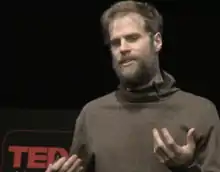Joe Betts-LaCroix
Jonathan "Joe" Betts-LaCroix (born Jonathan Betts February 26, 1962) is an American scientist and entrepreneur known for his discoveries in biophysics and for creating the world's smallest personal computer. He is working to optimize medical research priorities in the U.S.
Joe Betts-LaCroix | |
|---|---|
 Joe Betts-LaCroix in 2011 | |
| Born | February 26, 1962 |
| Alma mater | Harvard College |
| Occupation(s) | Executive Director, Health Extension |
| Website | evocator.org |
Academics
Beginning in earth sciences at Harvard, Betts-LaCroix contributed to the field of long-term regulation of oxygen on Earth over multi-100 Million-year timespans, quantifying the effect of the burial efficiency of organic carbon as a feedback mechanism.[1]
At MIT, he designed and built an autonomous, robotic system that enables research into ocean circulation patterns and climate change, by operating untended for up to one year at sea on battery power and collecting hyper-pure water samples at predetermined intervals.[2]
In work at Caltech, Betts-LaCroix moved into biophysics, publishing a paper in Science that has been cited by more than 700 subsequent scientific works.[3] In this work, he, along with David Beratan and José Onuchic proved for the first time that electron-transfer rates in proteins are determined by the electron orbital interactions in the protein structure.[4]
Hardware
In 2000, Betts-LaCroix cofounded OQO, a computer hardware and software OEM credited by the Guinness World Records as having created the world's smallest Windows PC.[5] This created a new category of mobile computing devices between PDAs and laptops, which were initially dubbed the "Ultra Personal Computer", and which subsequently became known as the "Netbook". The device won many awards for its innovation, aesthetics and functionality.[6][7][8][9][10]
After OQO, Betts-Lacroix was active in Silicon Valley as a lecturer and mentor for CEOs of start up companies.[11]
Biotechnology & biomedicine
Betts-LaCroix has participated in the Quantified Self movement since the beginning,[12] and has given numerous presentations on aspects of self experimentation and tracking, including experiments in the 28-Hour day.[13]
In 2010 he joined startup Halcyon Molecular to lead its automation efforts.[14] Halcyon, funded by, among others, Elon Musk and Peter Thiel, attempted to sequence human DNA using electron microscopes. The underlying goal of Halcyon's work was to make meaningful progress in understanding human biology in order to improve medicine.[14]
Following the theme of improving medicine, Betts-LaCroix founded the Health Extension Foundation in 2012.[15] The efforts of the people working in Health Extension are motivated by recognizing that
- Most healthcare money treats age-related diseases;
- Aging is the single biggest risk factor for these diseases;
- But funding to address the biochemical processes of aging is less than 0.01% of healthcare spending—and correcting this missed opportunity to optimally assign medical research and translation priorities.[16]
In 2013 Betts-LaCroix cofounded Vium, which has raised $33M to accelerate the development of new medical therapies by automating in-vivo research.[17][18] Vium launched publicly in 2016,[19] and was later acquired by Recursion in 2020.[20]
Betts-LaCroix is also a biotech angel investor in such companies as StemCentrx, Recursion Pharma[21] and Spring Discovery,[22] as well as a part-time contributor at Y Combinator.[23]
In 2022 Betts-LaCroix cofounded Retro Biosciences, which emerged out of stealth with $180 million in funding from OpenAI CEO Sam Altman[24] to focus on extending healthy human lifespans.[25]
See also
References
- Betts, Jonathan (1991). "The oxygen content of ocean bottom waters, the burial efficiency of organic carbon, and the regulation of atmospheric oxygen". Palaeogeography, Palaeoclimatology, Palaeoecology. 97 (1–2): 5–18. Bibcode:1991PPP....97....5B. doi:10.1016/0031-0182(91)90178-T. PMID 11538093.
- Bell, Jory (2002). "MITESS: a moored in situ trace element serial sampler for deep-sea moorings". Deep Sea Research Part I: Oceanographic Research Papers. 49 (11): 2103–2118. Bibcode:2002DSRI...49.2103B. doi:10.1016/S0967-0637(02)00126-7.
- "Google Scholar citations". Retrieved 22 April 2018.
- Beratan, DN (1991). "Protein electron transfer rates set by the bridging secondary and tertiary structure". Science. 252 (5010): 1285–1288. Bibcode:1991Sci...252.1285B. doi:10.1126/science.1656523. PMID 1656523. Retrieved 18 June 2013.
- Guinness Book of World Records 2006, ISBN 978-0-553-58906-1
- "OQO Model 2+ wins Popular Mechanics Editor's Choice Award". Retrieved 18 June 2013.
- "Business 2.0 Editors' Choice: OQO". Retrieved 18 June 2013.
- "PopSci's Best Of CES: OQO Model 02". 18 January 2007. Retrieved 18 June 2013.
- "OQO Wins The Stevie Award – 2008 Best Product". 2008-06-23. Retrieved 18 June 2013.
- "OQO Wins Japans 2007 Good Design Award". 2007-11-13. Retrieved 18 June 2013.
- "Startup Company Lawyer". 4 May 2009. Retrieved 18 June 2013.
- "First Meeting of The Quantified Self Meetup Group". Retrieved 18 June 2013.
- "Quantified Self: Joe Betts-LaCroix on the 28-Hour Day". Quantified Self. 2011-09-22. Retrieved 18 June 2013.
- "VentureBeat: Genome Entrepreneurs". 2012-04-21. Retrieved 18 June 2013.
- "Oakland Futurist: Health Extension Salon". 2013-01-26. Retrieved 18 June 2013.
- "Health Extension: Mission". Retrieved 18 June 2013.
- "Bloomberg Businessweek: Building a Better Mouse Cage". Bloomberg News. Retrieved 29 January 2017.
- "BioCentury: Digital Preclinical". Retrieved 29 January 2017.
- "Xconomy: Silicon Valley Vets Aim to Shake Up Preclinical Testing With Vium". 2016-06-02. Retrieved 29 January 2017.
- "Recursion Acquires Vium Bolstering Its Efforts to Industrialize Drug Discovery". 28 July 2020. Retrieved 21 July 2021.
- "Joe Betts-LaCroix - Angel List". Retrieved 22 April 2018.
- "Spring Discovery Raises $4.25M in Seed Funding". 2018-02-26. Retrieved 22 April 2018.
- Y Combinator's Summer Reading List 2017. Retrieved 22 April 2018.
- "Sam Altman invested $180 million into a company trying to delay death". MIT Technology Review. 8 March 2023.
- "Retro Biosciences Raises $180 Million With Goal of Extending Lifespan By 10 Years". Retrieved 12 April 2022.
External links
- Health Extension
- "Joe Betts-LaCroix at TEDxSF 2011"
- Goethe Institute: "Transience and Permanence"
- Oakland Futurist: "Health Extension Salon #9"